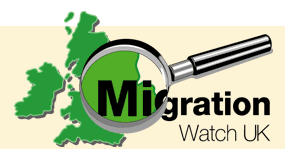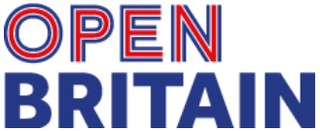Related Research Articles
Since 1945, immigration to the United Kingdom, controlled by British immigration law and to an extent by British nationality law, has been significant, in particular from the Republic of Ireland and from the former British Empire, especially India, Bangladesh, Pakistan, the Caribbean, South Africa, Nigeria, Ghana, Kenya, and Hong Kong. Since the accession of the UK to the European Communities in the 1970s and the creation of the EU in the early 1990s, immigrants relocated from member states of the European Union, exercising one of the European Union's Four Freedoms. In 2021, since Brexit came into effect, previous EU citizenship's right to newly move to and reside in the UK on a permanent basis does not apply anymore. A smaller number have come as asylum seekers seeking protection as refugees under the United Nations 1951 Refugee Convention.

Migration Watch UK is a British think-tank and campaign group which argues for lower immigration into the United Kingdom. Founded in 2001, the group believes that international migration places undue demand on limited resources and that the current level of immigration is not sustainable.

The 2016 United Kingdom European Union membership referendum, commonly referred to as the EU referendum or the Brexit referendum, was a referendum that took place on 23 June 2016 in the United Kingdom (UK) and Gibraltar under the provisions of the European Union Referendum Act 2015 to ask the electorate whether the country should continue to remain a member of, or leave, the European Union (EU). The result was a vote in favour of leaving the EU, triggering calls to begin the process of the country's withdrawal from the EU commonly termed "Brexit".

Brexit was the withdrawal of the United Kingdom (UK) from the European Union (EU). Following a referendum held in the UK on 23 June 2016, Brexit officially took place at 23:00 GMT on 31 January 2020. The UK, which joined the EU's precursors the European Communities (EC) on 1 January 1973, is the only member state to have withdrawn from the EU. Following Brexit, EU law and the Court of Justice of the European Union no longer have primacy over British laws. The European Union (Withdrawal) Act 2018 retains relevant EU law as domestic law, which the UK can amend or repeal.
Issues in the 2016 United Kingdom European Union membership referendum are the economic, human and political issues that were discussed during the campaign about the withdrawal of the United Kingdom from the European Union, during the period leading up to the Brexit referendum of 23 June 2016. [Issues that have arisen since then are outside the scope of this article].

Open Britain is a British pro-European Union campaign group set up in the aftermath of the 2016 European Union referendum.

Between 2017 and 2019, representatives of the United Kingdom and the European Union negotiated the terms of Brexit. The UK's planned its withdrawal from membership of the EU. These negotiations arose following the decision of the Parliament of the United Kingdom to invoke Article 50 of the Treaty on European Union, following the UK's EU membership referendum on 23 June 2016.

The United Kingdom's post-Brexit relationship with the European Union and its members is governed by the Brexit withdrawal agreement and the EU–UK Trade and Cooperation Agreement. The latter was negotiated in 2020 and has applied since January 2021.
Tanja Bueltmann, is a German-British historian and academic, who holds the chair in International History at the University of Strathclyde. She specialises in the history of migration and diaspora. She is also a citizens' rights campaigner and founder of the EU Citizens' Champion campaign.

The impact of Brexit on the Irish border and its adjacent polities involves changes in trade, customs, immigration checks, local economies, services, recognition of qualifications, medical cooperation, and other matters, as it is the only land border between the United Kingdom and the European Union.

The Chequers plan, officially known as The future relationship between the United Kingdom and the European Union , was a UK Government white paper concerning Brexit, published on 12 July 2018 by the prime minister, Theresa May. The paper was based on a three-page cabinet agreement from 6 July 2018 and laid out the type of future relationship between the UK and the European Union (EU) that the UK sought to achieve in the Brexit negotiations. At the time it was anticipated that the United Kingdom would leave the European Union on 29 March 2019.

The Brexit withdrawal agreement, officially titled Agreement on the withdrawal of the United Kingdom of Great Britain and Northern Ireland from the European Union and the European Atomic Energy Community, is a treaty between the European Union (EU), Euratom, and the United Kingdom (UK), signed on 24 January 2020, setting the terms of the withdrawal of the UK from the EU and Euratom. The text of the treaty was published on 17 October 2019, and is a renegotiated version of an agreement published in November 2018. The earlier version of the withdrawal agreement was rejected by the House of Commons on three occasions, leading to the resignation of Theresa May as Prime Minister and the appointment of Boris Johnson as the new prime minister on 24 July 2019.
The Irish backstop was a proposed protocol to a draft Brexit withdrawal agreement that never came into force. It was developed by the May government and the European Commission in December 2017 and finalised in November 2018, and aimed to prevent an evident border between the Republic of Ireland and Northern Ireland after Brexit.

55 Tufton Street is a four-storey Georgian-era townhouse on historic Tufton Street, in Westminster, London, owned by businessman Richard Smith. Since the 2010s the building has hosted a network of libertarian lobby groups and think tanks related to pro-Brexit, climate science denial and other fossil-fuel lobby groups. Some of the organisations it houses have close connections with those at 57 Tufton Street next door, including the Centre for Policy Studies and CapX.

Brexit negotiations in 2017 took place between the United Kingdom and the European Union for the withdrawal of the United Kingdom from the European Union following the United Kingdom European Union membership referendum on 23 June 2016. The negotiating period began on 29 March 2017 when the United Kingdom served the withdrawal notice under Article 50 of the Treaty on European Union. The period for negotiation stated in Article 50 is two years from notification, unless an extension is agreed. In March 2019, Prime Minister of the United Kingdom Theresa May and European Leaders negotiated a two-week delay for the Parliament of the United Kingdom to agree upon The Government's Brexit Treaty, moving the date from 29 March 2019 to 12 April 2019. Negotiations between the United Kingdom and the European Union regarding Brexit began in June 2017.

Brexit negotiations in 2019 started in August, after having originally concluded in November 2018 with the release of the withdrawal agreement. Negotiations took place between the United Kingdom and the European Union during 2017 and 2018 for the withdrawal of the United Kingdom from the European Union following the referendum held on 23 June 2016.

A no-deal Brexit was the potential withdrawal of the United Kingdom (UK) from the European Union (EU) without a withdrawal agreement. Under Article 50 of the Maastricht Treaty, the Treaties of the European Union would have ceased to apply once a withdrawal agreement was ratified or if the two years had passed since a member state had indicated its will to leave the European Union. The two-year period could have been extended by unanimous consent from all member states, including the member state that was wishing to leave the European Union.
Another Europe is Possible is a civil society organisation based in the United Kingdom which was founded in February 2016 to campaign for the 'Remain' option during the 2016 United Kingdom European Union membership referendum, while also advocating for internal reform of the EU. The group describes itself as advocating a "Remain position in the EU referendum from a specifically left, progressive perspective" and came together to work "across party political lines to campaign for democracy, human rights, and social justice". It states that the EU requires "radical and far-reaching reform, breaking with austerity economics and pioneering a radically new development strategy". The group gained attention as a high-profile protest organising platform during the 2019 British prorogation controversy.
Immigrants from Eastern Europe and their descendants have been present in the United Kingdom, in small numbers, for several centuries, with subsequent large migrations in the 21st century. At times, British media also included people with Central European ancestry in this category. This is similar to the definition of Eastern European in the United States, Canada, and Australia: Coming from former Eastern Bloc countries.
References
- 1 2 "the3million (t3m) | LobbyFacts Database". lobbyfacts.eu.
- 1 2 3 4 5 "the3million | About us". the3million.
- ↑ "the3million". PMP Magazine | PoliticsMeansPolitics.com.
- ↑ "Assets data" (PDF). assets.publishing.service.gov.uk. Retrieved 2020-01-11.
- ↑ "Get help applying to the EU Settlement Scheme". GOV.UK.
- ↑ "FREE EU Citizens' Rights Awareness Events | Stratford-on-Avon District Council". www.stratford.gov.uk.
- ↑ "StackPath" (PDF). www.instituteforgovernment.org.uk.
- ↑ "The3million And Open Rights Group Seek To Appeal Immigration Exemption Judgment". www.leighday.co.uk.
- ↑ "HuffPost is now part of Verizon Media". consent.yahoo.com.
- ↑ "#DeniedMyVote was unlawful - help the3million challenge the Government". CrowdJustice.
- ↑ "Info". beta.companieshouse.gov.uk. Retrieved 2020-01-11.
- ↑ "THE3MILLION LTD - Overview (free company information from Companies House)". beta.companieshouse.gov.uk.
- ↑ "Data". beta.companieshouse.gov.uk. Retrieved 2020-01-11.
- ↑ "Who We Fund | Unbound Philanthropy". www.unboundphilanthropy.org.
- ↑ "Migrant Assistance | International Organization for Migration". unitedkingdom.iom.int.
- ↑ "Financial statement" (PDF). www.phf.org.uk. 2018. Retrieved 2020-01-11.
- ↑ "The 3Million". Mayor's Question Time. 2019-02-14.
- ↑ Lisa O'Carroll (2019-07-12). "Government faces judicial review over EU citizens denied vote". The Guardian – via www.theguardian.com.
- ↑ "the3million | World news | The Guardian". the Guardian.
- ↑ "UK minister: EU nationals lacking settled status could be deported after Brexit". 2019-10-10.
- ↑ "HuffPost is now part of Verizon Media". consent.yahoo.com.
- ↑ "Sturgeon slams Johnson's 'despicable dog whistle' EU migrant comments". The National.
- ↑ Bock, Pauline (2019-12-09). "EU citizens criticise Boris Johnson's 'xenophobic' migration comment". euronews.
- ↑ "Boris Johnson urged to apologise for 'scapegoating migrants' on eve of general election". The Independent. 2019-12-11.
- ↑ O'Malley, James (2019-10-09). "How to stop Brexit from creating a Windrush on steroids". Wired UK– via www.wired.co.uk.
- ↑ Silva, Chantal Da (2019-12-13). "Britain To 'Bear Down On Migration' After Boris Johnson Election Victory". Newsweek. Retrieved 2023-04-23.